
Jun 18, 2014 | Focolare Worldwide
 Another step forward for Slot Mob, the campaign against gambling supported by several associations and the media, thanks also to young people: it took place in Catania, (Italy), where the City took a stand against slot machines, approving an amendment in the resolution of the municipal domestic and waste tax, which reduces by 50% the tax on waste to those business people that remove them from their shops. This is a reduction for two years in total, which includes a commitment not to install any other gambling machine for 10 years. The event to promote public establishments which do not have slot machines and video poker took place in Catania on 22nd February. On that occasion “Youth for Unity” in their publication “Grafoteens”, an information sheet for young people in Sicily, Calabria and Malta – posed themselves the question about “an ethic that is less about the world of gambling in general and which affects more and more the poor areas of the city”, including children, in spite of the prohibitions, and conversely on “an ethic that emerges in a stronger way regarding the use of goods confiscated from the Mafia, and which, in Calabria, the ‘Ndrangheta (a Mafia organization) continues to attack”. From this the meaning of the article summary is clear, “What side is the state on?” This constitutes a specific request to the administrative institutions to take a firm stand to support ethics which despite everything survive. And the answer came in June, with the resolution of the Municipality. The “Let’s get in the game” committee which promoted Slot Mob, and the “Teens for Unity”, who were committed to pursuing its instances were understandably satisfied. It’s a sign of detachment from the very strong culture of patronage and lobby of the managers of slot machines, wrote Giancarlo Morello in the editorial of the June issue of Grafoteens . We also appreciate the commitment and promise-keeping that some councillors demonstrated in the days of the creation of the Slot Mob, and who were then committed to the idea of rewarding those who would take away these machines. It all constituted a first signal towards achieving the “Let’s get in the Game Committee” and Grafoteens’ goal of a “City without slots”. The city of Catania is also working on a municipal regulation to counter the spread of pathological gambling. Like Catania, there are many municipalities where the fight against gambling, by mobilizing citizens, has taken many forms through the Slot Mob campaign. Supporters of the initiative include the Italian New City magazine and the Economy of Communion. To learn more or to arrange a Slot Mob in your city go to: http://www.nexteconomia.org/le-attivita/slot-mob http://www.edc-online.org/it/home-it/slotmob.html http://vimeo.com/98447447
Another step forward for Slot Mob, the campaign against gambling supported by several associations and the media, thanks also to young people: it took place in Catania, (Italy), where the City took a stand against slot machines, approving an amendment in the resolution of the municipal domestic and waste tax, which reduces by 50% the tax on waste to those business people that remove them from their shops. This is a reduction for two years in total, which includes a commitment not to install any other gambling machine for 10 years. The event to promote public establishments which do not have slot machines and video poker took place in Catania on 22nd February. On that occasion “Youth for Unity” in their publication “Grafoteens”, an information sheet for young people in Sicily, Calabria and Malta – posed themselves the question about “an ethic that is less about the world of gambling in general and which affects more and more the poor areas of the city”, including children, in spite of the prohibitions, and conversely on “an ethic that emerges in a stronger way regarding the use of goods confiscated from the Mafia, and which, in Calabria, the ‘Ndrangheta (a Mafia organization) continues to attack”. From this the meaning of the article summary is clear, “What side is the state on?” This constitutes a specific request to the administrative institutions to take a firm stand to support ethics which despite everything survive. And the answer came in June, with the resolution of the Municipality. The “Let’s get in the game” committee which promoted Slot Mob, and the “Teens for Unity”, who were committed to pursuing its instances were understandably satisfied. It’s a sign of detachment from the very strong culture of patronage and lobby of the managers of slot machines, wrote Giancarlo Morello in the editorial of the June issue of Grafoteens . We also appreciate the commitment and promise-keeping that some councillors demonstrated in the days of the creation of the Slot Mob, and who were then committed to the idea of rewarding those who would take away these machines. It all constituted a first signal towards achieving the “Let’s get in the Game Committee” and Grafoteens’ goal of a “City without slots”. The city of Catania is also working on a municipal regulation to counter the spread of pathological gambling. Like Catania, there are many municipalities where the fight against gambling, by mobilizing citizens, has taken many forms through the Slot Mob campaign. Supporters of the initiative include the Italian New City magazine and the Economy of Communion. To learn more or to arrange a Slot Mob in your city go to: http://www.nexteconomia.org/le-attivita/slot-mob http://www.edc-online.org/it/home-it/slotmob.html http://vimeo.com/98447447

May 9, 2016 | Non categorizzato
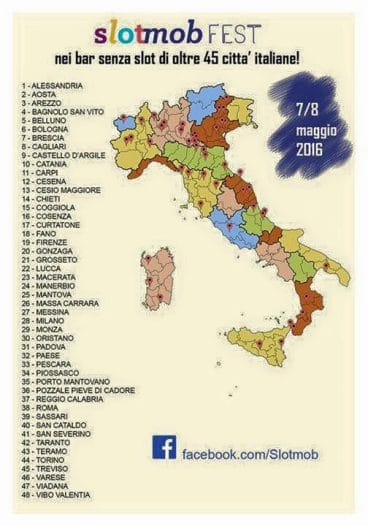 It was the summer of 2013 when an idea came up among some teenagers from Rome of doing something to curb the proliferation of gambling in the city. It was becoming more and more common to see both old and young people glued to the slot machines that are found in many Italian bars. Despite the economic crisis, in recent years the supply and consumption of gambling in Italy has increased dramatically. Italians spend 85 billion a year on the more than 50,000 latest generation slot machines, and the latest estimates are that more than 800,000 people suffer from gambling addiction. We see how the gambling business is devastating our cities, depleting the fabric of society and creating isolation and loneliness. At the helm of this exponential growth of gambling is an economic vision in which the only thing that matters is profit for the multinationals with the consent from a state that also sees it as an opportunity for profit. In front of such a bleak scene the teenagers from Rome wondered what they could do . . . and from there came the idea of rewarding the barkeepers who have chosen not to make gambling available at their establishments. They went to breakfast at their bars en masse as a Slotmob. Initially they proposed doing it in Rome and Milan, but the simple and practical idea fascinated many Italians from north to south of the peninsula. There have been 120 Slotmobs in the past two and a half years, with the participation of over 10,000 people and a network of more than 200 associations. The project has created relationships with very diverse groups, created meeting spaces, awareness and mended the social bond that gambling had disintegrated. “In Rome we concentrated our efforts on an area known as the Italian Las Vegas,” Maria Chiara explains. “In a short time a network was formed with 7 local associations that deal with different aspects of gambling. A sincere relationship was created, not without the usual difficulties of working with one another. That’s how the Let’s Not Gamble Ourselves Project began and now involves several city schools. Talking to teenagers about the power of our choices and of how we can change unjust situations beginning from ourselves, is not in fact very easy. But it actually is important to build a more just world and to involve young people in the change process.”
It was the summer of 2013 when an idea came up among some teenagers from Rome of doing something to curb the proliferation of gambling in the city. It was becoming more and more common to see both old and young people glued to the slot machines that are found in many Italian bars. Despite the economic crisis, in recent years the supply and consumption of gambling in Italy has increased dramatically. Italians spend 85 billion a year on the more than 50,000 latest generation slot machines, and the latest estimates are that more than 800,000 people suffer from gambling addiction. We see how the gambling business is devastating our cities, depleting the fabric of society and creating isolation and loneliness. At the helm of this exponential growth of gambling is an economic vision in which the only thing that matters is profit for the multinationals with the consent from a state that also sees it as an opportunity for profit. In front of such a bleak scene the teenagers from Rome wondered what they could do . . . and from there came the idea of rewarding the barkeepers who have chosen not to make gambling available at their establishments. They went to breakfast at their bars en masse as a Slotmob. Initially they proposed doing it in Rome and Milan, but the simple and practical idea fascinated many Italians from north to south of the peninsula. There have been 120 Slotmobs in the past two and a half years, with the participation of over 10,000 people and a network of more than 200 associations. The project has created relationships with very diverse groups, created meeting spaces, awareness and mended the social bond that gambling had disintegrated. “In Rome we concentrated our efforts on an area known as the Italian Las Vegas,” Maria Chiara explains. “In a short time a network was formed with 7 local associations that deal with different aspects of gambling. A sincere relationship was created, not without the usual difficulties of working with one another. That’s how the Let’s Not Gamble Ourselves Project began and now involves several city schools. Talking to teenagers about the power of our choices and of how we can change unjust situations beginning from ourselves, is not in fact very easy. But it actually is important to build a more just world and to involve young people in the change process.”  Maria Chiara continues: “The Slotmob experience is making us meet many people, many stories that show us that gambling is an open wound on our society. During one Slotmob a man that had helped us to organise some games with the young people took the microphone and told his own experience as a regular gambler. He said to us: ‘My life is made of bright spots and shadows, and what makes me gamble is the solitude. But today seeing all of you here I no longer feel alone. So I commit to stop gambling. If you see me in front of a slot machine, you’re authorised to reprimand me and remind me of this promise I make today’.” “When we look back,” Maria Chiara concludes, “we see that we’ve had unimagined results. Two laws were blocked that would have reduced the power of mayors in limiting gambling; we got a partial ban on television advertising, and increased media attention on the problem of gambling. We’re aware that we have a long road ahead of us, we’d like advertising for gambling to be completely banned and we want to re-open the discussion on whether gambling should be in the hands of multinationals. For this reason on May 7 we will be on more than 40 public squares across Italy restating our yes to a different economy and rewarding bars that have said no to gambling.”
Maria Chiara continues: “The Slotmob experience is making us meet many people, many stories that show us that gambling is an open wound on our society. During one Slotmob a man that had helped us to organise some games with the young people took the microphone and told his own experience as a regular gambler. He said to us: ‘My life is made of bright spots and shadows, and what makes me gamble is the solitude. But today seeing all of you here I no longer feel alone. So I commit to stop gambling. If you see me in front of a slot machine, you’re authorised to reprimand me and remind me of this promise I make today’.” “When we look back,” Maria Chiara concludes, “we see that we’ve had unimagined results. Two laws were blocked that would have reduced the power of mayors in limiting gambling; we got a partial ban on television advertising, and increased media attention on the problem of gambling. We’re aware that we have a long road ahead of us, we’d like advertising for gambling to be completely banned and we want to re-open the discussion on whether gambling should be in the hands of multinationals. For this reason on May 7 we will be on more than 40 public squares across Italy restating our yes to a different economy and rewarding bars that have said no to gambling.”
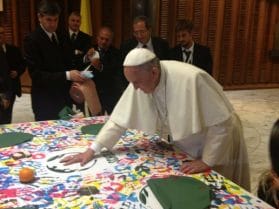
Feb 10, 2015 | Non categorizzato
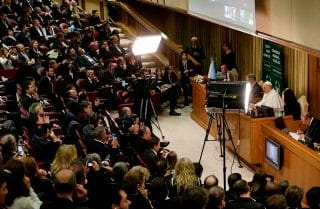 An educational agreement to be built in harmony between the families, civil and cultural institutions. This is the idea on which the project of Scholas Occurrentes (schools that respond to the needs of the population) is based, created in Argentina launched by former Archbishop of Buenos Aires, J.M. Bergoglio and relaunched today at international levels. The aim of the «Scholas is to integrate in some way, the educational efforts of all, and rebuild the educational agreement in harmony, since only with the harmonization of all those in charge of educating our youth and our children, can education bring about change. This is why Scholas seeks to integrate education with culture, sports, science; this is why Scholas tries to build bridges, to move out of the “small-scale” and seek these aspects further beyond. Today this interaction of knowledge is being actualized in all continents, » Pope Francis stressed at the end of the 4th World Congress held in the Vatican from 2-5 February. The climax of the congress, was the video link up with some disabled adolescents who participated in the inclusive scholastic programme of the 400,000 schools participating in the project. Among them was a 13 year old visually-impaired girl, Isabel, who loves athletics and asked the Pope to tell all those who suffer impairments «not to give up, because with some effort, they can achieve their goals.» Yes, because «all of you have a treasure chest inside », Pope Francis said in his video message, «a great treasure. Your task is to open the chest, bring out that treasure, nurture it, share it with others, and also receive the treasure of others.» More than 250 participants, among which, the major experts in the field of education and social responsibility, those professing different creeds and cultures, and delegations of sports organisations, as well as representatives of the world of art, show biz and culture, ITC companies that, through the most advanced technologies, help to «create a classroom where all are welcome,» as José María del Corral, Scholas Director declared.
An educational agreement to be built in harmony between the families, civil and cultural institutions. This is the idea on which the project of Scholas Occurrentes (schools that respond to the needs of the population) is based, created in Argentina launched by former Archbishop of Buenos Aires, J.M. Bergoglio and relaunched today at international levels. The aim of the «Scholas is to integrate in some way, the educational efforts of all, and rebuild the educational agreement in harmony, since only with the harmonization of all those in charge of educating our youth and our children, can education bring about change. This is why Scholas seeks to integrate education with culture, sports, science; this is why Scholas tries to build bridges, to move out of the “small-scale” and seek these aspects further beyond. Today this interaction of knowledge is being actualized in all continents, » Pope Francis stressed at the end of the 4th World Congress held in the Vatican from 2-5 February. The climax of the congress, was the video link up with some disabled adolescents who participated in the inclusive scholastic programme of the 400,000 schools participating in the project. Among them was a 13 year old visually-impaired girl, Isabel, who loves athletics and asked the Pope to tell all those who suffer impairments «not to give up, because with some effort, they can achieve their goals.» Yes, because «all of you have a treasure chest inside », Pope Francis said in his video message, «a great treasure. Your task is to open the chest, bring out that treasure, nurture it, share it with others, and also receive the treasure of others.» More than 250 participants, among which, the major experts in the field of education and social responsibility, those professing different creeds and cultures, and delegations of sports organisations, as well as representatives of the world of art, show biz and culture, ITC companies that, through the most advanced technologies, help to «create a classroom where all are welcome,» as José María del Corral, Scholas Director declared.  And therefore rediscover, the educational itinerary game, education in beauty, rediscovery of harmony between the “language of the brain ” and the “language of the heart” which are the educational programmes the Pope outlined in his speech. It was the spark that lit up in the hearts of the players in the game, presented at the Scholas convention, and who in the previous days had share their experiences, research studies and educational projects in which learning and solidarity merge in a pedagogical strategy open to all: students with particular educational needs, dependence, poverty, care of the environment. To this regard, amongst others, were also some projects of the Focolare, such as the Udisha project in India, mobilization against gambling, with the Slot Mob project in Itay, the Living Peace project in Egypt. Furthermore, two morning sessions were dedicated to deepening the pedagogy of Learning and Solidary Service, developed in the United States in the 60s and promoted over the last twenty years by Maria Nieves Tapia of the Focolare together will many others of the many networks and ogranisations. The CLAYSS (Latina American Centre for learning and Solidary Service,) undertakes to integrate this with dialogue and research studies on fraternity and pro-social activities. The main pedagogical theories were presented at the Congress by Carina Rossa, of Education towards Encounter and Solidarity (EIS) LUMSA and Education and Unity (EDU), theories which the Scholas network is trying to implement. «The youth are the ones who will benefit», concluded Pope Francis, underlining the importance of this work which builds bridges between the youth of all nations and creeds, educating them towards peace and fraternity. He then affirmed: «We will not change the world if we do not change education ». This is a real «rescue plan» put into action, as he had said on other occasions, to limit the reject culture which leaves no room in society for a generation of children and adolescents, and continue believing that «life is a great treasure, but which is meaningful only if shared with others. » To participate in the project, consult: www.scholasoccurrentes.org The Pope’s entire speech
And therefore rediscover, the educational itinerary game, education in beauty, rediscovery of harmony between the “language of the brain ” and the “language of the heart” which are the educational programmes the Pope outlined in his speech. It was the spark that lit up in the hearts of the players in the game, presented at the Scholas convention, and who in the previous days had share their experiences, research studies and educational projects in which learning and solidarity merge in a pedagogical strategy open to all: students with particular educational needs, dependence, poverty, care of the environment. To this regard, amongst others, were also some projects of the Focolare, such as the Udisha project in India, mobilization against gambling, with the Slot Mob project in Itay, the Living Peace project in Egypt. Furthermore, two morning sessions were dedicated to deepening the pedagogy of Learning and Solidary Service, developed in the United States in the 60s and promoted over the last twenty years by Maria Nieves Tapia of the Focolare together will many others of the many networks and ogranisations. The CLAYSS (Latina American Centre for learning and Solidary Service,) undertakes to integrate this with dialogue and research studies on fraternity and pro-social activities. The main pedagogical theories were presented at the Congress by Carina Rossa, of Education towards Encounter and Solidarity (EIS) LUMSA and Education and Unity (EDU), theories which the Scholas network is trying to implement. «The youth are the ones who will benefit», concluded Pope Francis, underlining the importance of this work which builds bridges between the youth of all nations and creeds, educating them towards peace and fraternity. He then affirmed: «We will not change the world if we do not change education ». This is a real «rescue plan» put into action, as he had said on other occasions, to limit the reject culture which leaves no room in society for a generation of children and adolescents, and continue believing that «life is a great treasure, but which is meaningful only if shared with others. » To participate in the project, consult: www.scholasoccurrentes.org The Pope’s entire speech
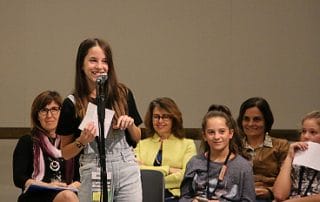
Nov 9, 2018 | Non categorizzato
 500 “Prophetic Economy” participants from 40 countries and all five continents were gathered from 2 to 4 November at the International Mariapolis Centre, CastelGandolfo, near Rome, Italy. The event facilitated interactive and intergenerational exchange through a program of inspiring contributions, work groups and creative workshops. What began as an international platform of encounter, exchange and encouragement, the event went far beyond the limits of mere networking, to become a driving force of energy and commitment for initiatives and actions at local, regional and international levels. Internationally-renowned economist Jeffrey Sachs, a key speaker at the event, affirmed, “Prophetic economy means an economy that operates in the vision of the prophets, of justice, of peace, a vision of meeting the needs of the poorest people, a vision of protecting creation.”.
500 “Prophetic Economy” participants from 40 countries and all five continents were gathered from 2 to 4 November at the International Mariapolis Centre, CastelGandolfo, near Rome, Italy. The event facilitated interactive and intergenerational exchange through a program of inspiring contributions, work groups and creative workshops. What began as an international platform of encounter, exchange and encouragement, the event went far beyond the limits of mere networking, to become a driving force of energy and commitment for initiatives and actions at local, regional and international levels. Internationally-renowned economist Jeffrey Sachs, a key speaker at the event, affirmed, “Prophetic economy means an economy that operates in the vision of the prophets, of justice, of peace, a vision of meeting the needs of the poorest people, a vision of protecting creation.”.  Diversity characterized the participants: economists, ecological activists, experts from the financial sector, students, entrepreneurs, people from a variety of different cultural and religious backgrounds, with a wide age range – the youngest being only 9 years old! The younger attendees were protagonists both in age-specific sessions involving interaction with experts in the fields of economy and ecology, and in cross-generational panels, contributing their own distinctive questions, proposals and life experiences. “How good it has been to have the children and young people with us” said Josiane Gauthier, Secretary General of Catholic Development Alliance CIDSE. Inspiring us with their profound intelligence and grace and truth”. The event highlighted examples of good economic practices. As Italian economist Stefano Zamagni explained, “It‘s those who look ahead and dare to gaze beyond the obstacles. The current economic and social models no longer work”. “These kind of economic practices already exist”, observed Lorna Gold, economist with Trocair, the Irish development agency, “but all too often they’re invisible in the media and our culture.”
Diversity characterized the participants: economists, ecological activists, experts from the financial sector, students, entrepreneurs, people from a variety of different cultural and religious backgrounds, with a wide age range – the youngest being only 9 years old! The younger attendees were protagonists both in age-specific sessions involving interaction with experts in the fields of economy and ecology, and in cross-generational panels, contributing their own distinctive questions, proposals and life experiences. “How good it has been to have the children and young people with us” said Josiane Gauthier, Secretary General of Catholic Development Alliance CIDSE. Inspiring us with their profound intelligence and grace and truth”. The event highlighted examples of good economic practices. As Italian economist Stefano Zamagni explained, “It‘s those who look ahead and dare to gaze beyond the obstacles. The current economic and social models no longer work”. “These kind of economic practices already exist”, observed Lorna Gold, economist with Trocair, the Irish development agency, “but all too often they’re invisible in the media and our culture.” 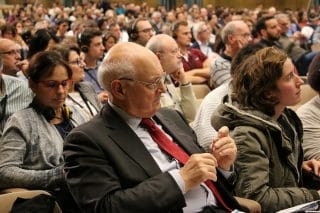 The “Prophetic Economy Award” was launched to promote good practice through examples of the prophetic economy in action. Carlo Petrini, founder of the Slow Food Movement, acknowledged the award winners. “They practice a form of economic reality different from the norm, they see beyond the pervasive economic modes. They are not so much prophetic in vision, as in their daily practice.” “This is not about utopias or ‘small islands’ within an unjust and unchanging system. Here, we’re looking at signals of tangible change,” observed Argentinean economist Cristina Calvo. “In the face of massive global financial mechanisms, we run the risk of feeling powerless. The antidote to being static is to widen the spectrum of action on all levels: micro, medium and macro.” A significant element within this event was the space given to those living in situations of poverty or social exclusion to make their own voice heard. “The time has come to rethink our economy and rethink our world, not ‘for’ the poor, not even with their participation, but starting from them,” concluded Jean Tonglet of ATD Fourth World. “Our knowledge is incomplete until it includes the knowledge of those we want to liberate from poverty, who struggle with its effects on a daily basis.” The challenge launched by this event is to invent new ways of collaboration, in order to be stronger and more creative in efforts to change to lifestyles based on a more sharing, more just and more sustainable economy. “The new idea at the basis of this event,” explained Italian economist Luigino Bruni, “was to bring ecology and economy together. In today’s world, we cannot speak of poverty without mentioning climate. One of the great messages of Pope Francis’ pontificate is the invitation to activate processes, not occupy spaces, because time is superior to space. Here, we can say that a process has been started”.
The “Prophetic Economy Award” was launched to promote good practice through examples of the prophetic economy in action. Carlo Petrini, founder of the Slow Food Movement, acknowledged the award winners. “They practice a form of economic reality different from the norm, they see beyond the pervasive economic modes. They are not so much prophetic in vision, as in their daily practice.” “This is not about utopias or ‘small islands’ within an unjust and unchanging system. Here, we’re looking at signals of tangible change,” observed Argentinean economist Cristina Calvo. “In the face of massive global financial mechanisms, we run the risk of feeling powerless. The antidote to being static is to widen the spectrum of action on all levels: micro, medium and macro.” A significant element within this event was the space given to those living in situations of poverty or social exclusion to make their own voice heard. “The time has come to rethink our economy and rethink our world, not ‘for’ the poor, not even with their participation, but starting from them,” concluded Jean Tonglet of ATD Fourth World. “Our knowledge is incomplete until it includes the knowledge of those we want to liberate from poverty, who struggle with its effects on a daily basis.” The challenge launched by this event is to invent new ways of collaboration, in order to be stronger and more creative in efforts to change to lifestyles based on a more sharing, more just and more sustainable economy. “The new idea at the basis of this event,” explained Italian economist Luigino Bruni, “was to bring ecology and economy together. In today’s world, we cannot speak of poverty without mentioning climate. One of the great messages of Pope Francis’ pontificate is the invitation to activate processes, not occupy spaces, because time is superior to space. Here, we can say that a process has been started”.  The younger participants spent time considering and embracing the challenge launched by the World Food Organization to work to eradicate hunger in the world by 2030 (#zerohunger),formulating their own proposals: – to promote the idea of a “deferred meal”, asking restaurants and bars to encourage their clients to buy an extra meal for someone in need, and issuing a #zerohunger sticker to participating businesses; – to campaign for a new subject in the school curriculum teaching the Sustainable Development Goals promoted by the United Nations. Prophetic Economy is an international project jointly run by seven organizations: Pope John XXIII Community Association, Nomadelfia, The Global Catholic Climate Movement, ATD Fourth World, Associazione Mondo di Comunità e Famiglia (World of Community and Family Association), SlotMob initiative and the international Focolare Movement represented by its Economy of Communion project and ‘Teens for Unity’ youth section.
The younger participants spent time considering and embracing the challenge launched by the World Food Organization to work to eradicate hunger in the world by 2030 (#zerohunger),formulating their own proposals: – to promote the idea of a “deferred meal”, asking restaurants and bars to encourage their clients to buy an extra meal for someone in need, and issuing a #zerohunger sticker to participating businesses; – to campaign for a new subject in the school curriculum teaching the Sustainable Development Goals promoted by the United Nations. Prophetic Economy is an international project jointly run by seven organizations: Pope John XXIII Community Association, Nomadelfia, The Global Catholic Climate Movement, ATD Fourth World, Associazione Mondo di Comunità e Famiglia (World of Community and Family Association), SlotMob initiative and the international Focolare Movement represented by its Economy of Communion project and ‘Teens for Unity’ youth section.
Photo album on Flickr 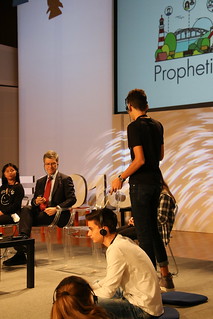

Jun 10, 2018 | Non categorizzato
 Prophetic Economy…between the “already” and the “not yet” : The International Event promoted by the EoC and several associations and movements intending to respond to the cry of the world and the poor. It will take place in Castelgandolfo (Rome)
Prophetic Economy…between the “already” and the “not yet” : The International Event promoted by the EoC and several associations and movements intending to respond to the cry of the world and the poor. It will take place in Castelgandolfo (Rome)
Our world faces an ecological and social crisis. Climate change and rising inequality are being fuelled by unjust economic structures, short-sighted policies and outdated practices. People all around the world. BELIEVE passionately in human development & sustainability, WORK tirelessly to change the rules and demand justice. It is time to COME TOGETHER and be more than the sum of our part
“Prophetic Economy” stems from the desire to approach those with whom we have a common goal, in order to learn from each other, find new ways of collaboration, send a powerful message of hope especially to those who today are the victims of social and environmental injustice and to understand together how to act on the macro level. 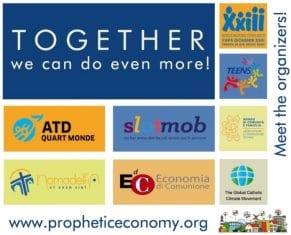 We immediately realized that we couldn’t start such a journey alone, but that we had to do it right away, together with other movements. That’s how the EoC working group was enriched by the presence of ATD Quart Monde, The Pope John XXIII Community (Associazione Papa Giovanni XXIII),, Nomadelfia, the Global Catholic Climate Movement, Slotmob, Mondo Comunità e Famiglia and Wordteens (Ragazzi per l’Unità) who today are our partners. We are convinced that the value of Prophetic Economy is not only represented by the realisation of the event in itself, but also by the process of mutual opening up and enrichment which has already been started by all promoters
We immediately realized that we couldn’t start such a journey alone, but that we had to do it right away, together with other movements. That’s how the EoC working group was enriched by the presence of ATD Quart Monde, The Pope John XXIII Community (Associazione Papa Giovanni XXIII),, Nomadelfia, the Global Catholic Climate Movement, Slotmob, Mondo Comunità e Famiglia and Wordteens (Ragazzi per l’Unità) who today are our partners. We are convinced that the value of Prophetic Economy is not only represented by the realisation of the event in itself, but also by the process of mutual opening up and enrichment which has already been started by all promoters
CHILDREN will be protagonists too!
In addition to bringing together those who make efforts in this area, this event also proposes a competition of best practices of “Prophetic Economy”, giving visibility and recognition to many of the protagonists of change who transmit a positive energy at the service of the common good.
135 change-makers and organizations from 35 countries have participated with their practices of prophetic economy. The 3 winners and other practices selected in the shortlist, will present live during the event.
Scientific Panel for “Prophetic Economy in Practice” Award 2018 : Dr.Vandana Shiva -India, Dr. Jeff Sachs – USA, Dr.Cristina Calvo – Argentina and Prof. Stefano Zamagni – Italy.

Simultaneously with the event there will be
satellite actions of a different nature organised in several countries around the world: the most important Prophetic Economy will be an international
Bankmob for disinvestment in fossil fuels, armament and gambling.
Info: www.propheticeconomy.org/ Prophetic Economy in practice – Award 2018 – download info e form

 Another step forward for Slot Mob, the campaign against gambling supported by several associations and the media, thanks also to young people: it took place in Catania, (Italy), where the City took a stand against slot machines, approving an amendment in the resolution of the municipal domestic and waste tax, which reduces by 50% the tax on waste to those business people that remove them from their shops. This is a reduction for two years in total, which includes a commitment not to install any other gambling machine for 10 years. The event to promote public establishments which do not have slot machines and video poker took place in Catania on 22nd February. On that occasion “Youth for Unity” in their publication “Grafoteens”, an information sheet for young people in Sicily, Calabria and Malta – posed themselves the question about “an ethic that is less about the world of gambling in general and which affects more and more the poor areas of the city”, including children, in spite of the prohibitions, and conversely on “an ethic that emerges in a stronger way regarding the use of goods confiscated from the Mafia, and which, in Calabria, the ‘Ndrangheta (a Mafia organization) continues to attack”. From this the meaning of the article summary is clear, “What side is the state on?” This constitutes a specific request to the administrative institutions to take a firm stand to support ethics which despite everything survive. And the answer came in June, with the resolution of the Municipality. The “Let’s get in the game” committee which promoted Slot Mob, and the “Teens for Unity”, who were committed to pursuing its instances were understandably satisfied. It’s a sign of detachment from the very strong culture of patronage and lobby of the managers of slot machines, wrote Giancarlo Morello in the editorial of the June issue of Grafoteens . We also appreciate the commitment and promise-keeping that some councillors demonstrated in the days of the creation of the Slot Mob, and who were then committed to the idea of rewarding those who would take away these machines. It all constituted a first signal towards achieving the “Let’s get in the Game Committee” and Grafoteens’ goal of a “City without slots”. The city of Catania is also working on a municipal regulation to counter the spread of pathological gambling. Like Catania, there are many municipalities where the fight against gambling, by mobilizing citizens, has taken many forms through the Slot Mob campaign. Supporters of the initiative include the Italian New City magazine and the Economy of Communion. To learn more or to arrange a Slot Mob in your city go to: http://www.nexteconomia.org/le-attivita/slot-mob http://www.edc-online.org/it/home-it/slotmob.html http://vimeo.com/98447447
Another step forward for Slot Mob, the campaign against gambling supported by several associations and the media, thanks also to young people: it took place in Catania, (Italy), where the City took a stand against slot machines, approving an amendment in the resolution of the municipal domestic and waste tax, which reduces by 50% the tax on waste to those business people that remove them from their shops. This is a reduction for two years in total, which includes a commitment not to install any other gambling machine for 10 years. The event to promote public establishments which do not have slot machines and video poker took place in Catania on 22nd February. On that occasion “Youth for Unity” in their publication “Grafoteens”, an information sheet for young people in Sicily, Calabria and Malta – posed themselves the question about “an ethic that is less about the world of gambling in general and which affects more and more the poor areas of the city”, including children, in spite of the prohibitions, and conversely on “an ethic that emerges in a stronger way regarding the use of goods confiscated from the Mafia, and which, in Calabria, the ‘Ndrangheta (a Mafia organization) continues to attack”. From this the meaning of the article summary is clear, “What side is the state on?” This constitutes a specific request to the administrative institutions to take a firm stand to support ethics which despite everything survive. And the answer came in June, with the resolution of the Municipality. The “Let’s get in the game” committee which promoted Slot Mob, and the “Teens for Unity”, who were committed to pursuing its instances were understandably satisfied. It’s a sign of detachment from the very strong culture of patronage and lobby of the managers of slot machines, wrote Giancarlo Morello in the editorial of the June issue of Grafoteens . We also appreciate the commitment and promise-keeping that some councillors demonstrated in the days of the creation of the Slot Mob, and who were then committed to the idea of rewarding those who would take away these machines. It all constituted a first signal towards achieving the “Let’s get in the Game Committee” and Grafoteens’ goal of a “City without slots”. The city of Catania is also working on a municipal regulation to counter the spread of pathological gambling. Like Catania, there are many municipalities where the fight against gambling, by mobilizing citizens, has taken many forms through the Slot Mob campaign. Supporters of the initiative include the Italian New City magazine and the Economy of Communion. To learn more or to arrange a Slot Mob in your city go to: http://www.nexteconomia.org/le-attivita/slot-mob http://www.edc-online.org/it/home-it/slotmob.html http://vimeo.com/98447447










 We immediately realized that we couldn’t start such a journey alone, but that we had to do it right away, together with other movements. That’s how the EoC working group was enriched by the presence of
We immediately realized that we couldn’t start such a journey alone, but that we had to do it right away, together with other movements. That’s how the EoC working group was enriched by the presence of 